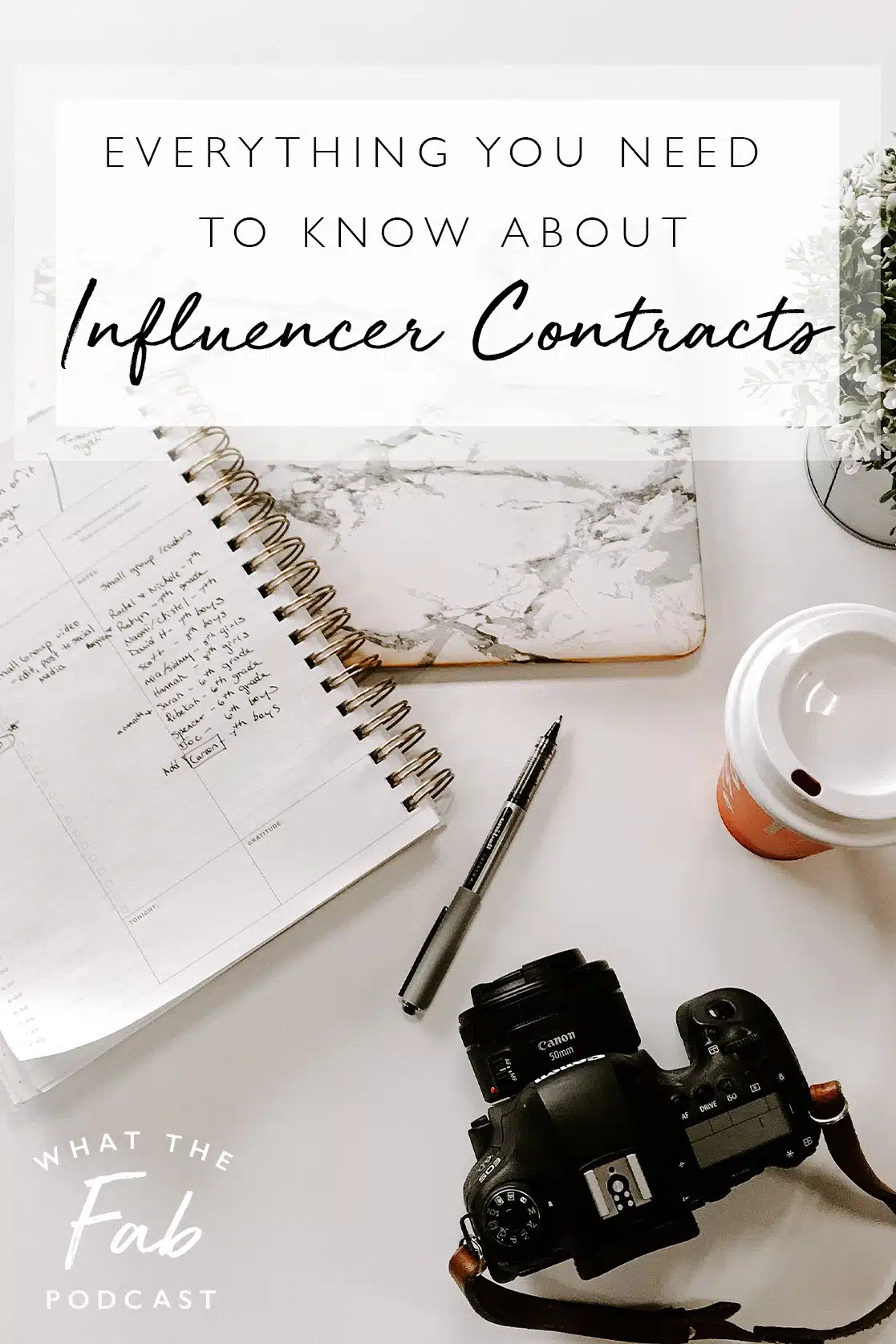
Listen to the episode:
You can also listen on: Apple Podcasts | Spotify | Google Podcasts
18: In this episode, we’re chatting all about influencer contracts! I’m sharing a Clubhouse chat with some of the ladies from Babes That Wander, where we discuss everything you need to know about influencer contracts, how to negotiate certain clauses, and how to protect yourself as a content creator. We get into:
– Exclusivity, whitelisting, content ownership
– Language and clauses to look out for when you’re reviewing a contract
– How to create your own influencer contract (You can also download my contract that I use for FREE and use it as your template here: whatthefab.com/influencer-contract)
– Clauses you need in your contracts like payment terms, kill clauses, “accidental” photo usage, etc. to protect yourself as a content creator
Be sure to follow @babes_thatwander and all the babes:
@lauryncakes
@livinglesh
@greta_hollar
@missmoorestyle
@mycurlyadventures_
@streetsbeatseats
Snap a screenshot of the podcast and tag me @wtfab sharing your thoughts on this episode, so I can reshare on my Stories too! Make sure you subscribe to the podcast to stay up to date on the latest episodes and interviews.
Lastly, please rate and review to support this podcast!

Show notes for Episode #18: Everything You Need to Know About Influencer Contracts: What to Include & What to Look Out For
Influencer marketing has become such a standard for brands rolling out marketing campaigns. Which of course, as social media influencers, we love to see!
As more and more brands lean into social media marketing, industry standards continue to shift and evolve. For example, whitelisting and content ownership was something I never worried about five years ago. I owned my content and no one else put ads behind it, and that was that!
It’s a whole new world when it comes to influencer marketing, and it’s essential that you have an influencer marketing agreement in place when you work with a company (I’m still shocked when I hear about influencers who don’t use a contract!). A contract ensures both parties are on the same page, and that you get paid. (V important)
And not only that, but you as the influencer need to be aware of a number of things that brands often try to slip into their influencer agreements that either a). you should be getting paid for or b). are totally unacceptable and shouldn’t be in your influencer contract at all.
If it sounds overwhelming, don’t worry! We’ve got tons of information on this in today’s podcast episode, and I’m laying out some of the highlights below.
Please note, we’re not lawyers and this is not legal advice. These are just things that based on our own experiences, we have come to look out for or include in our influencer contracts.
Things to look out for in a brand ambassador contract:
In perpetuity:
If a brand owns your content in perpetuity, it means forever. Your face could end up on a billboard without you getting paid for it. So ask the client to strike that language.
Exclusivity:
I always try to nail down expectations for exclusivity before the contract hits my inbox, but sometimes brands will slip in additional brands on their exclusivity list, or a longer time period than you discussed. Always review this and don’t be afraid to speak up if something is misaligned.
Whitelisting:
If you’re not familiar with whitelisting or boosting, it’s when the influencer agrees to let a third party (the brand) put paid advertising on Facebook and Instagram behind their sponsored post. Your photo will show up as an ad on people’s feeds, with a “shop now” or “learn more” button that directs to the brand’s website.
While some brands will try to position this as an added bonus for you, you should absolutely be charging for it. They’re using your content and likeness to drive traffic and sales on their website. Also, whitelisting can cause issues for your account as you have no control over what type of audience your content is being boosted to.
For example, a whitelisted post could drive a ton of male followers to your page, when you’re trying to serve and grow a female audience.
So all that being said, sometimes a brand will try to slip in whitelisting into their contract without asking you about it, and you should absolutely request that they either remove that section or increase their compensation.

Things that you as an influencer should try to include in your influencer contract:
Payment terms:
I always try to include payment terms of 30 days. Sometimes brands will start with 90 days, but you can always ask if that can be decreased.
Kill clause:
I have a clause in my contract that if a brand cancels a campaign at any time, they are obligated to pay me 100% of my rate. Sometimes brands will ask me to remove this clause, and other times they will ask me to tweak it so that it states that if I’ve done the work (like shooting/editing the photos) and they cancel, then they’ll still pay me. And others just sign without questioning it.
Late payments:
I’ve also got a section in my contract about how late payments will be handled. It’s rare that I have to invoke this, but it has happened a couple times. For every month the brand is late, they accrue 10% interest.
Things brands sometimes include in their influencer contracts that are fine:
Sometimes brands like to include sections about how to treat their confidential information and intellectual property rights. While it’s not something I include in my contract if I’m the one writing up the agreement, this is fine.
Companies also may include a section noting that you are an independent contractor and not an employee. Again, not something I feel the need to write up in my own contracts, but if a brand wants it in theirs to protect them, that’s fine.
Sometimes brands will note in a section how the Federal Trade Commission defines an appropriate sponsored disclosure. I think we all know this by now, but again, if the brand wants that in the contract, fine by me.
If you’re doing any kind of paid advertising on your social media platforms, you’ll absolutely want a social media influencer agreement in place.
Don’t forget that you can grab my contract PDF template here for your own use! It’s basically a general services agreement that I’ve updated over the years to create an influencer agreement template for myself.
If you’re an influencer, I hope this post was helpful for you! As always, you can slide right into my DMs @wtfab if you have questions.

Elise Armitage is an entrepreneur and founder of What The Fab, a travel + lifestyle blog based in California. At the beginning of 2019, Elise left her corporate job at Google to chase her dreams: being an entrepreneur and helping women find fabulous in the everyday. Since then, she’s launched her SEO course Six-Figure SEO, where she teaches bloggers how to create a passive revenue stream from their website using SEO. Featured in publications like Forbes, Elle, HerMoney, and Real Simple, Elise is a firm believer that you can be of both substance and style.



